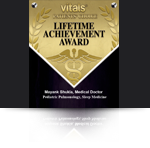Ready to Schedule an
Appointment with Dr. Shukla?
SLEEP HYGIENE
Good Sleep Hygiene
Good “sleep hygiene” is anything that helps maintain your health by keeping your mind and body rested and strong. The idea behind sleep hygiene is the same as dental hygiene. Both rely on nightly or daily rituals for consistently good hygiene. Just as you get in the habit of brushing, flossing, and visiting your dentist regularly, you must implement a nightly routine of healthy habits to improve your sleep hygiene, especially if you suffer from sleep disorders. Follow these sleep hygiene tips to help insure a good night’s sleep.
Sleep hygiene is as important as any other type of personal care, and, to help you understand what it involves, here are a few pointers to keep in mind.
Steps to Good Sleep Hygiene
- Wait until you are sleepy before going to bed. If you’re not sleepy at your regular bedtime, do something relaxing, read a book, listen to music, or do some other activity that will relax, not stimulate you. This will relax your body and distract your mind to remove your anxieties about sleep. Try an article about sleep from our Sleep Center.
- Pre-sleep rituals help to initiate relaxation each night before bed. A warm bath, light snack, or a few minutes of reading or listening to music can initiate good sleep. Avoid eating heavy meals near bedtime.
- If you’re not asleep in 20 minutes, get out of bed. Leave your bedroom and find something else that will relax you enough to make you sleepy.
- Don’t worry about how much sleep you’re getting. Some people lie in bed and fret about their inability to fall asleep, and start to panic thinking about how they’ll function the next day without sleep. These worries themselves keep people from getting restful sleep. Research has shown that most people get more sleep than they think they’re getting. Instead, think soothing thoughts, that you will fall asleep eventually and you’ll make it through the day somehow.
- Don’t keep checking the clock. Even if you can’t fall asleep, don’t keep looking to see how late it is and how long you’ve been lying in bed. This will only increase your anxiety.
- Try to keep a regular sleep/wake schedule. Wake up at the same time each day, even on weekends and holidays.
- Keep a regular daily schedule. Maintaining a regular schedule for meals, medications, chores and other activities helps keep your body’s clock running smoothly.
- Sleep a full night on a regular basis. Get enough sleep every day so you feel well rested, and avoid daytime naps. If you must nap during the day, try to keep it to less than an hour, and not after three o’clock in the afternoon.
- Use your bedroom only for sleeping. Do not eat, read, watch TV, talk on the phone, or play video games in bed.
- Keep in mind that some pre-sleep rituals are not conducive to good sleep hygiene. In our modern, interconnected world we often read from our laptop or tablet device before going trying to fall asleep. A growing in-the-know consensus argues that it is best to turn the screens off well before trying to go to sleep.
- Avoid caffeine and alcohol of any kind within six hours of bedtime. (we know – it’s harder than it sounds!)
- Do not smoke or ingest nicotine within two hours of bedtime.
- Exercise regularly, but avoid strenuous exercise within six hours of bedtime. Speak to your doctor before starting an exercise routine.
- Clear your mind of things that make you worry. Find ways to relieve stress and aggravation. The bed is a place to rest, not to ruminate about the day’s problems. Keeping a diary can help you discharge the day’s frustrations and anxieties before you go to bed.
- Maintain a quiet, dark and cool bedroom environment. Each individual has his or her own preferences for the ideal sleep environment. Avoid extremes. If noise helps you fall asleep, use white noise or soft music. If you need light, use off-light such as a night light in the bathroom or down the hall. Set the air conditioner or heat at a comfortable temperature for you. Keep a window slightly open if you need fresh air.
- Get enough sun exposure during the day. Sun exposure helps keep your body’s internal clock in sync with the external environment,
A Note on Allergies and Sleep Disorders
One of the leading challenges of good sleep hygiene is actually allergies. Allergies can impeded sleep, causing serious disruptions to your daily life. Dr. Shukla is an expert on allergies (including those plaguing people in and around the New York area) is an expert on allergies which affect both adults and children, and which can contribute to sleep problems.
Contact our New York Sleep Center
Sleep is nothing to take lightly. A good night’s rest is essential to a healthy and long life. If you are suffering with sleeplessness or other sleep disorders, you owe it to yourself (and your loved ones) to get the help you need.
Don’t suffer with sleepless nights. Sometimes poor quality sleep may be due to sleeping disorders that needs to be detected and treated. Let Dr. Mayank Shukla help you improve your quality sleep by detecting your sleeping disorder. Visit his New York Sleep Center today.
Awards and Recognition
Dr. Mayank Shukla Top-Rated Pulmonologist 2018 - 2024














